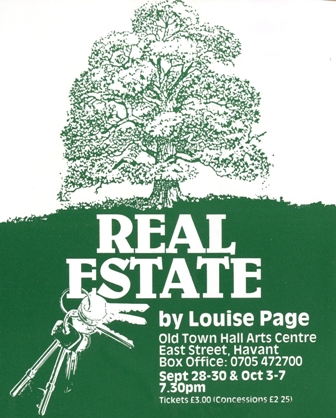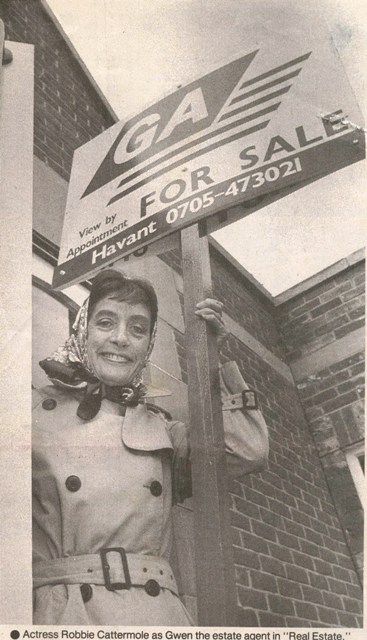Real Estate
Written by Louise Page
Thurs 28th September - Sat 30th September & Tues 3rd October - Sat 7th October 1989
Directed by Peter Corrigan
"Miss Page by accurate detailed loving writing has created four real people, sensitive to the needs of others yet each, ultimately, with an instinct for self-preservation. These are 'ordinary' people to whom nothing special happens. They become special, extraordinary because of the dignity their creator endows them with."
Giles Gordon (Spectator)
previous
production
next
production
Louise Page (b 1955)
Playwright, novelist and journalist Louise Page was born in London, but moved to Sheffield as a young girl. She was educated at the University of Birmingham, where she studied Drama and Theatre Arts. In 1979 she became Yorkshire Television's Fellow in Drama and Television at the University of Sheffield. She was awarded the George Devine Award for her play 'Salonika', which was performed at the Royal Court Theatre Upstairs in London in 1982, and was appointed Resident Writer at the Royal Court Theatre (1982-3). She was Royal Literary Fund Fellow at Edge Hill University from 2004-2006.
Acknowledged as one of the most prominent English feminist playwrights of her generation, her work is notable for its frank treatment of issues such as personal and political ethics, sexual mores, personal relationships, and death and bereavement. Her play 'Tissue', in particular, broke a taboo when it was first staged in 1978 by addressing the topic of breast cancer. Page takes a broadly socialist stance: her plays of the 1980s, in particular, were highly critical of the exploitation of the working class, and tackled topical issues such as the Thatcherite values of success and the Falklands War. Some of her plays have been hailed for their imaginative staging and for her use of language, which ranges from the lyrical to the colloquial, the latter drawing particularly on speech patterns of northern England. She writes for both television and radio and worked for ten years on BBC Radio 4's long-running radio serial The Archers. She now runs Words4work with her husband, the writer Christopher Hawes, organising seminars and workshops to help businesses improve the standard of their written English.
The story takes place over a period of approximately 3 months. Act one begins in the autumn in a wood and the kitchen of Dick and Gwen's house. 20 years ago, Jenny fell out with her step-father, Dick and left home. Still single, but now pregnant Jenny returns to the home he shares with her mother, Gwen. She is hoping for help and support but this is not guaranteed. The father of Jenny's child, Eric, is a divorcee, torn between his relationship with his own child who is growing up very fast and the demands of a new family. Act two is centred on Gwen's estate agency office. Where we see that she, as Jenny's mother, realises that the help expected of her is more than she is prepared to give. This play was published in 1984 and first produced at the Tricycle Theatre, London in 1984.
top of page

This play was staged at Havant Arts Centre, East Street Havant - Bench Theatre's home since 1977.
| Jenny | Jo German |
| Gwen | Robbie Cattermole |
| Dick | David Penrose |
| Eric | Steve Foden |
Crew
| Director | Peter Corrigan |
| Stage Manager | Jane Hemsley-Brown |
| Lighting Design | Ray Abbott |
| Lighting Operation | Rob Thrush, Rob Finn |
| Costumes | Ingrid Corrigan |
| Poster Design | Pete Woodward |
| Set Design | Nic Moseley |
| Set Construction | David Hemsley-Brown |
| Front of House | David Hemsley-Brown |
Director's Notes
I find relationships between people fascinating. The ways in which they speak to each other and the ways in which their body language confirms or denies their utterances have always intrigued me. This play provides the perfect vehicle with its spare dialogue and vast sub-text for exploring below the surface of the four characters we meet. The cast has worked hard at establishing the emotional truth of the characters and the audience should recognise the universality of some of the moments encountered. The production design takes the story told beyond its specific participants and locations, and the wood reflects the eternal nature of fertility and propagation. It also whispers of primitive rites and the need to propitiate and make sacrifices to the unknown and intangible. The play reminds us that self-preservation as individuals or as a species is too important to be left to chance.
Peter Corrigan
top of page
Production Photographs

